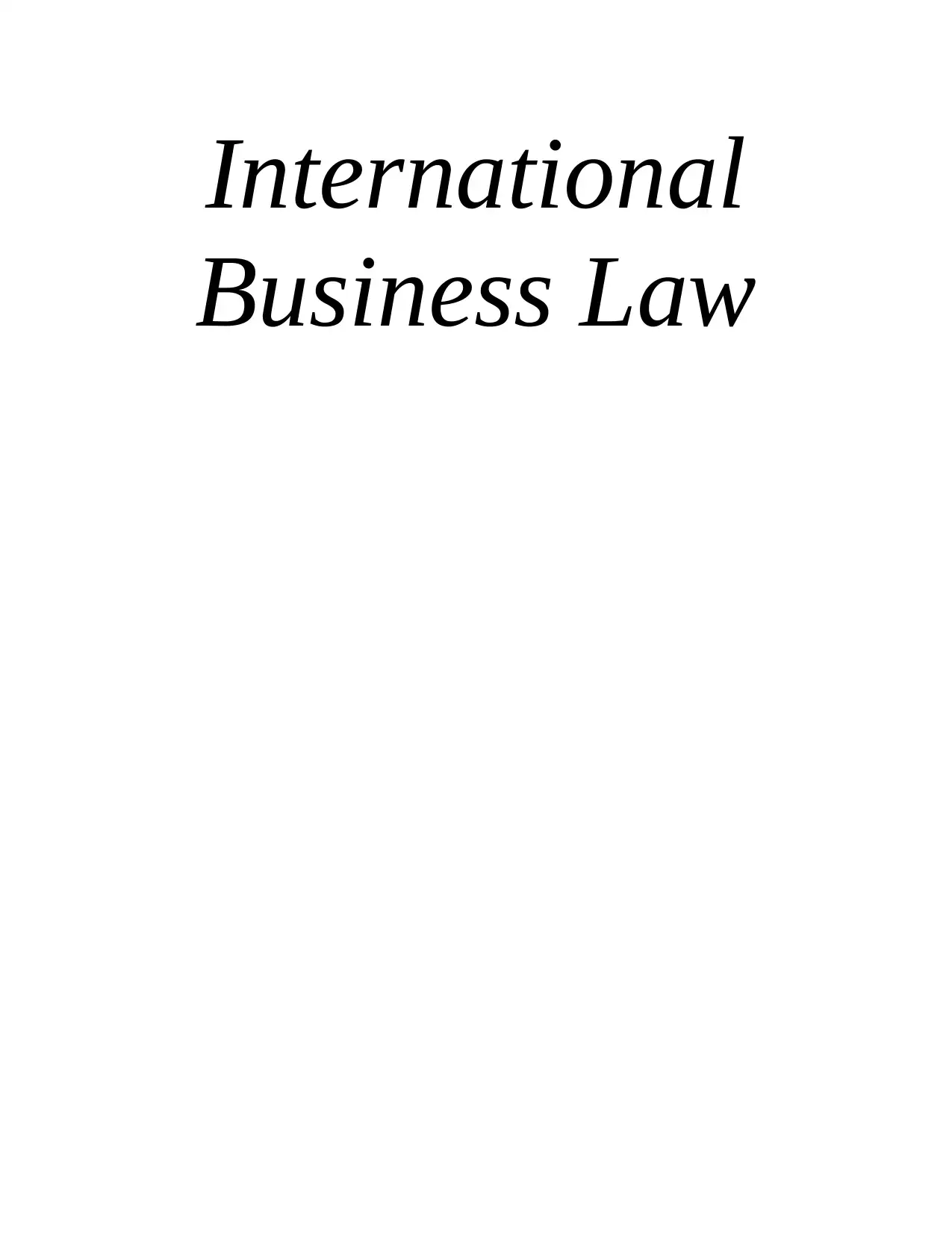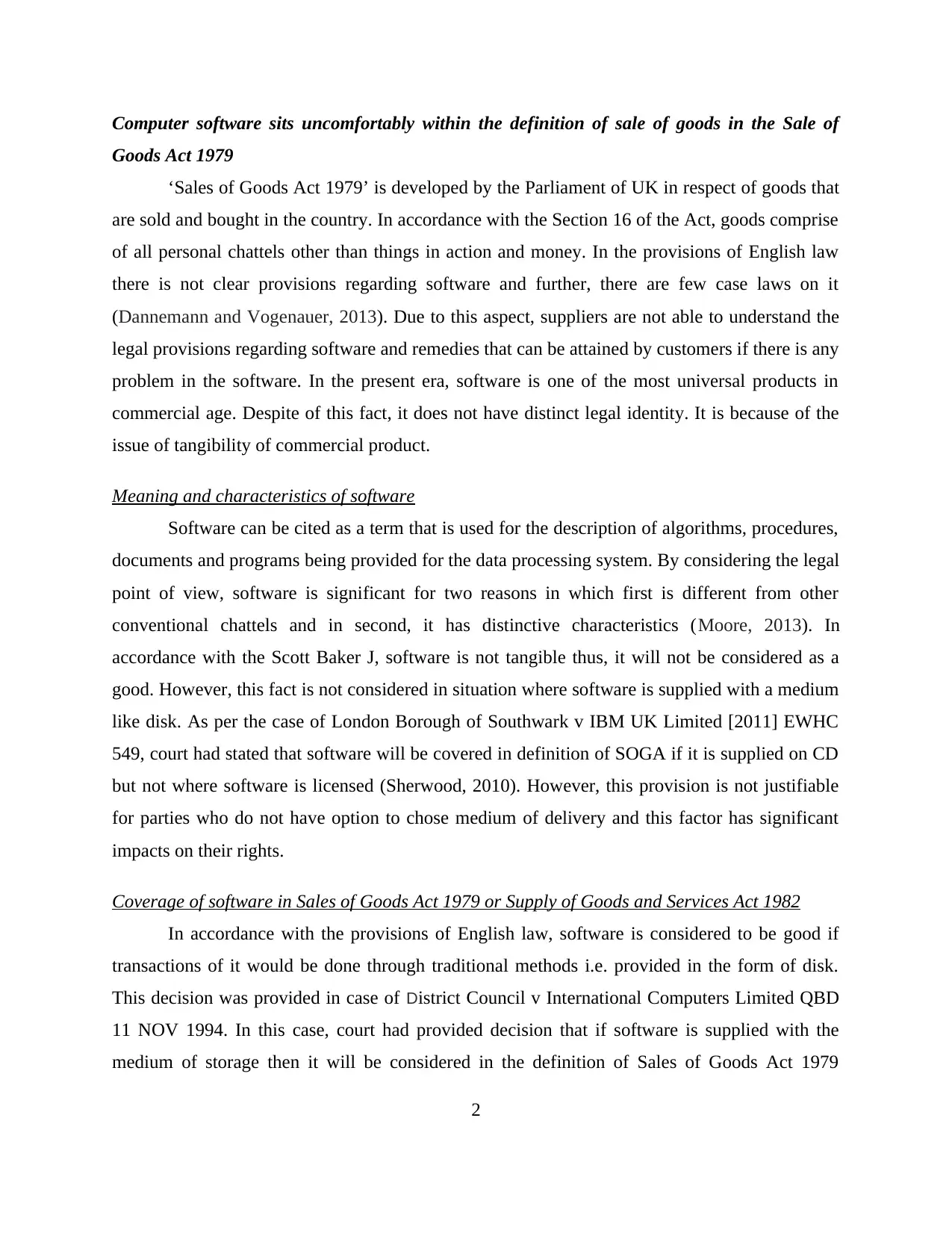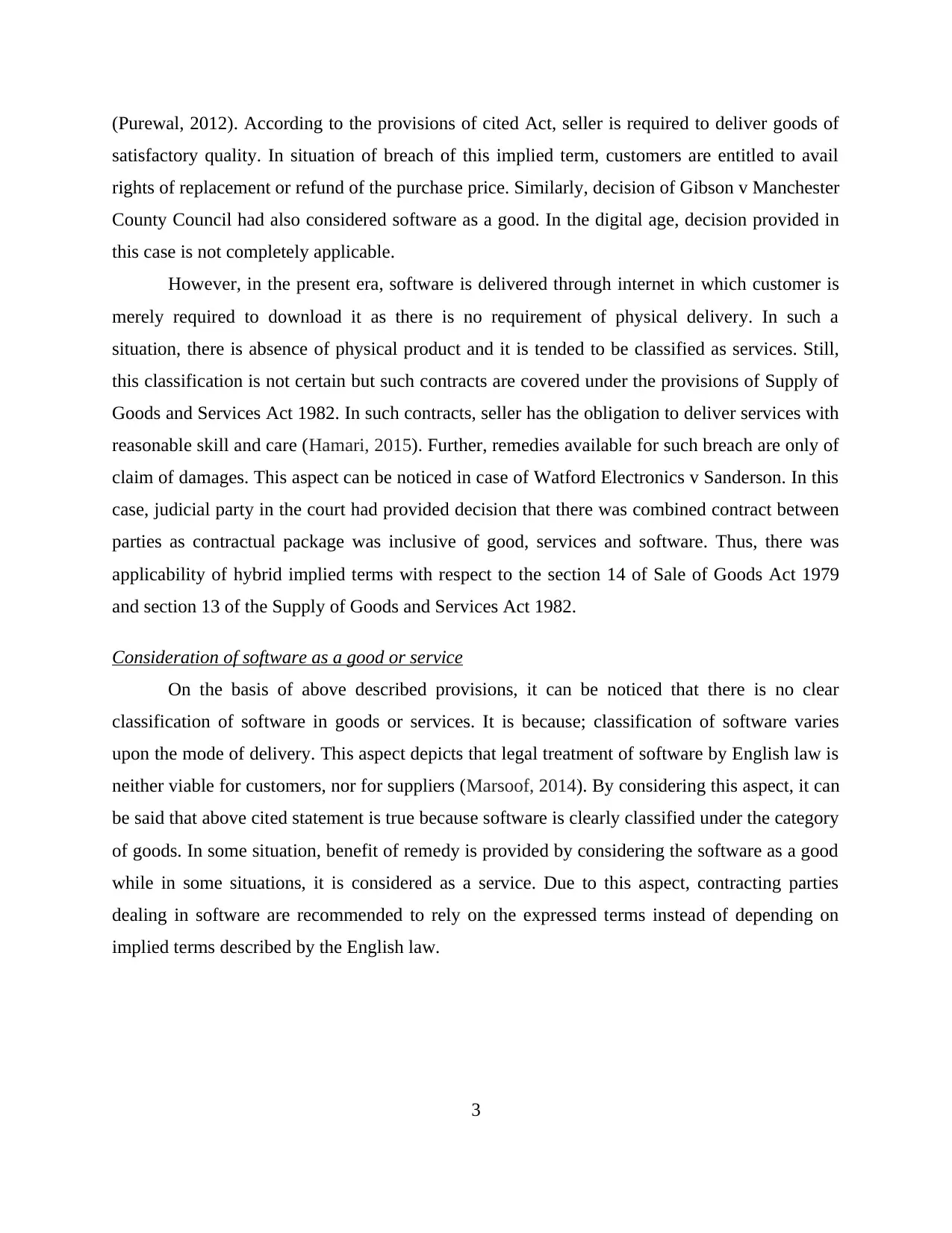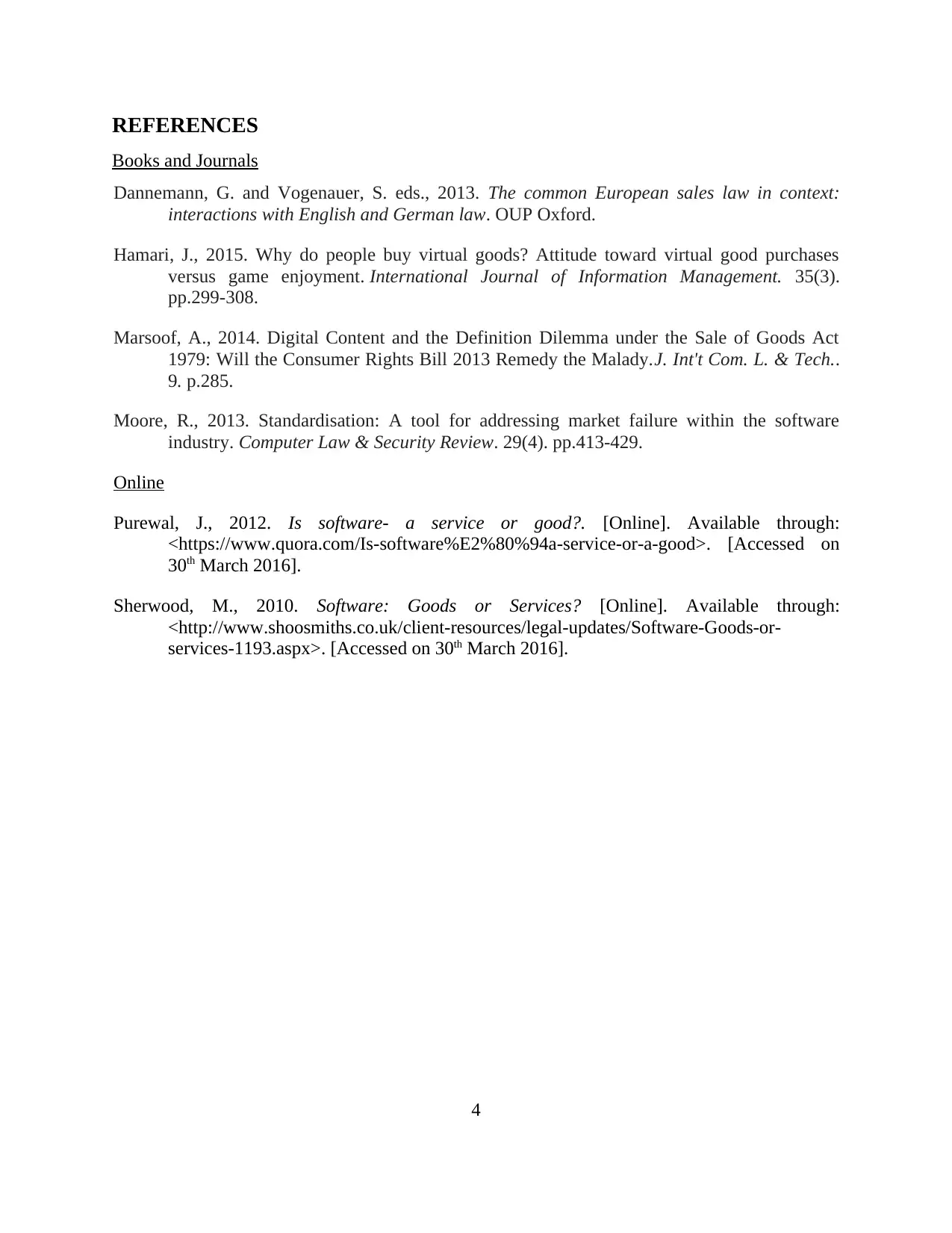Analysis of Software Classification in International Business Law
VerifiedAdded on 2020/01/07
|4
|1113
|273
Essay
AI Summary
This essay examines the classification of computer software within the framework of international business law, specifically focusing on whether software is considered a good or a service under the Sale of Goods Act 1979 and the Supply of Goods and Services Act 1982. The analysis highlights the ambiguity and challenges in classifying software, particularly in the digital age where software is often delivered online rather than through physical media. The essay explores relevant case law, such as London Borough of Southwark v IBM UK Limited, and discusses how the mode of delivery influences the legal treatment of software. It also addresses the implications for contractual terms, remedies, and the rights of both suppliers and customers. The conclusion underscores the need for clear contractual terms to address the uncertainties in software classification under existing English law.

International
Business Law
Business Law
Paraphrase This Document
Need a fresh take? Get an instant paraphrase of this document with our AI Paraphraser

Computer software sits uncomfortably within the definition of sale of goods in the Sale of
Goods Act 1979
‘Sales of Goods Act 1979’ is developed by the Parliament of UK in respect of goods that
are sold and bought in the country. In accordance with the Section 16 of the Act, goods comprise
of all personal chattels other than things in action and money. In the provisions of English law
there is not clear provisions regarding software and further, there are few case laws on it
(Dannemann and Vogenauer, 2013). Due to this aspect, suppliers are not able to understand the
legal provisions regarding software and remedies that can be attained by customers if there is any
problem in the software. In the present era, software is one of the most universal products in
commercial age. Despite of this fact, it does not have distinct legal identity. It is because of the
issue of tangibility of commercial product.
Meaning and characteristics of software
Software can be cited as a term that is used for the description of algorithms, procedures,
documents and programs being provided for the data processing system. By considering the legal
point of view, software is significant for two reasons in which first is different from other
conventional chattels and in second, it has distinctive characteristics (Moore, 2013). In
accordance with the Scott Baker J, software is not tangible thus, it will not be considered as a
good. However, this fact is not considered in situation where software is supplied with a medium
like disk. As per the case of London Borough of Southwark v IBM UK Limited [2011] EWHC
549, court had stated that software will be covered in definition of SOGA if it is supplied on CD
but not where software is licensed (Sherwood, 2010). However, this provision is not justifiable
for parties who do not have option to chose medium of delivery and this factor has significant
impacts on their rights.
Coverage of software in Sales of Goods Act 1979 or Supply of Goods and Services Act 1982
In accordance with the provisions of English law, software is considered to be good if
transactions of it would be done through traditional methods i.e. provided in the form of disk.
This decision was provided in case of District Council v International Computers Limited QBD
11 NOV 1994. In this case, court had provided decision that if software is supplied with the
medium of storage then it will be considered in the definition of Sales of Goods Act 1979
2
Goods Act 1979
‘Sales of Goods Act 1979’ is developed by the Parliament of UK in respect of goods that
are sold and bought in the country. In accordance with the Section 16 of the Act, goods comprise
of all personal chattels other than things in action and money. In the provisions of English law
there is not clear provisions regarding software and further, there are few case laws on it
(Dannemann and Vogenauer, 2013). Due to this aspect, suppliers are not able to understand the
legal provisions regarding software and remedies that can be attained by customers if there is any
problem in the software. In the present era, software is one of the most universal products in
commercial age. Despite of this fact, it does not have distinct legal identity. It is because of the
issue of tangibility of commercial product.
Meaning and characteristics of software
Software can be cited as a term that is used for the description of algorithms, procedures,
documents and programs being provided for the data processing system. By considering the legal
point of view, software is significant for two reasons in which first is different from other
conventional chattels and in second, it has distinctive characteristics (Moore, 2013). In
accordance with the Scott Baker J, software is not tangible thus, it will not be considered as a
good. However, this fact is not considered in situation where software is supplied with a medium
like disk. As per the case of London Borough of Southwark v IBM UK Limited [2011] EWHC
549, court had stated that software will be covered in definition of SOGA if it is supplied on CD
but not where software is licensed (Sherwood, 2010). However, this provision is not justifiable
for parties who do not have option to chose medium of delivery and this factor has significant
impacts on their rights.
Coverage of software in Sales of Goods Act 1979 or Supply of Goods and Services Act 1982
In accordance with the provisions of English law, software is considered to be good if
transactions of it would be done through traditional methods i.e. provided in the form of disk.
This decision was provided in case of District Council v International Computers Limited QBD
11 NOV 1994. In this case, court had provided decision that if software is supplied with the
medium of storage then it will be considered in the definition of Sales of Goods Act 1979
2

(Purewal, 2012). According to the provisions of cited Act, seller is required to deliver goods of
satisfactory quality. In situation of breach of this implied term, customers are entitled to avail
rights of replacement or refund of the purchase price. Similarly, decision of Gibson v Manchester
County Council had also considered software as a good. In the digital age, decision provided in
this case is not completely applicable.
However, in the present era, software is delivered through internet in which customer is
merely required to download it as there is no requirement of physical delivery. In such a
situation, there is absence of physical product and it is tended to be classified as services. Still,
this classification is not certain but such contracts are covered under the provisions of Supply of
Goods and Services Act 1982. In such contracts, seller has the obligation to deliver services with
reasonable skill and care (Hamari, 2015). Further, remedies available for such breach are only of
claim of damages. This aspect can be noticed in case of Watford Electronics v Sanderson. In this
case, judicial party in the court had provided decision that there was combined contract between
parties as contractual package was inclusive of good, services and software. Thus, there was
applicability of hybrid implied terms with respect to the section 14 of Sale of Goods Act 1979
and section 13 of the Supply of Goods and Services Act 1982.
Consideration of software as a good or service
On the basis of above described provisions, it can be noticed that there is no clear
classification of software in goods or services. It is because; classification of software varies
upon the mode of delivery. This aspect depicts that legal treatment of software by English law is
neither viable for customers, nor for suppliers (Marsoof, 2014). By considering this aspect, it can
be said that above cited statement is true because software is clearly classified under the category
of goods. In some situation, benefit of remedy is provided by considering the software as a good
while in some situations, it is considered as a service. Due to this aspect, contracting parties
dealing in software are recommended to rely on the expressed terms instead of depending on
implied terms described by the English law.
3
satisfactory quality. In situation of breach of this implied term, customers are entitled to avail
rights of replacement or refund of the purchase price. Similarly, decision of Gibson v Manchester
County Council had also considered software as a good. In the digital age, decision provided in
this case is not completely applicable.
However, in the present era, software is delivered through internet in which customer is
merely required to download it as there is no requirement of physical delivery. In such a
situation, there is absence of physical product and it is tended to be classified as services. Still,
this classification is not certain but such contracts are covered under the provisions of Supply of
Goods and Services Act 1982. In such contracts, seller has the obligation to deliver services with
reasonable skill and care (Hamari, 2015). Further, remedies available for such breach are only of
claim of damages. This aspect can be noticed in case of Watford Electronics v Sanderson. In this
case, judicial party in the court had provided decision that there was combined contract between
parties as contractual package was inclusive of good, services and software. Thus, there was
applicability of hybrid implied terms with respect to the section 14 of Sale of Goods Act 1979
and section 13 of the Supply of Goods and Services Act 1982.
Consideration of software as a good or service
On the basis of above described provisions, it can be noticed that there is no clear
classification of software in goods or services. It is because; classification of software varies
upon the mode of delivery. This aspect depicts that legal treatment of software by English law is
neither viable for customers, nor for suppliers (Marsoof, 2014). By considering this aspect, it can
be said that above cited statement is true because software is clearly classified under the category
of goods. In some situation, benefit of remedy is provided by considering the software as a good
while in some situations, it is considered as a service. Due to this aspect, contracting parties
dealing in software are recommended to rely on the expressed terms instead of depending on
implied terms described by the English law.
3
⊘ This is a preview!⊘
Do you want full access?
Subscribe today to unlock all pages.

Trusted by 1+ million students worldwide

REFERENCES
Books and Journals
Dannemann, G. and Vogenauer, S. eds., 2013. The common European sales law in context:
interactions with English and German law. OUP Oxford.
Hamari, J., 2015. Why do people buy virtual goods? Attitude toward virtual good purchases
versus game enjoyment. International Journal of Information Management. 35(3).
pp.299-308.
Marsoof, A., 2014. Digital Content and the Definition Dilemma under the Sale of Goods Act
1979: Will the Consumer Rights Bill 2013 Remedy the Malady.J. Int't Com. L. & Tech..
9. p.285.
Moore, R., 2013. Standardisation: A tool for addressing market failure within the software
industry. Computer Law & Security Review. 29(4). pp.413-429.
Online
Purewal, J., 2012. Is software- a service or good?. [Online]. Available through:
<https://www.quora.com/Is-software%E2%80%94a-service-or-a-good>. [Accessed on
30th March 2016].
Sherwood, M., 2010. Software: Goods or Services? [Online]. Available through:
<http://www.shoosmiths.co.uk/client-resources/legal-updates/Software-Goods-or-
services-1193.aspx>. [Accessed on 30th March 2016].
4
Books and Journals
Dannemann, G. and Vogenauer, S. eds., 2013. The common European sales law in context:
interactions with English and German law. OUP Oxford.
Hamari, J., 2015. Why do people buy virtual goods? Attitude toward virtual good purchases
versus game enjoyment. International Journal of Information Management. 35(3).
pp.299-308.
Marsoof, A., 2014. Digital Content and the Definition Dilemma under the Sale of Goods Act
1979: Will the Consumer Rights Bill 2013 Remedy the Malady.J. Int't Com. L. & Tech..
9. p.285.
Moore, R., 2013. Standardisation: A tool for addressing market failure within the software
industry. Computer Law & Security Review. 29(4). pp.413-429.
Online
Purewal, J., 2012. Is software- a service or good?. [Online]. Available through:
<https://www.quora.com/Is-software%E2%80%94a-service-or-a-good>. [Accessed on
30th March 2016].
Sherwood, M., 2010. Software: Goods or Services? [Online]. Available through:
<http://www.shoosmiths.co.uk/client-resources/legal-updates/Software-Goods-or-
services-1193.aspx>. [Accessed on 30th March 2016].
4
1 out of 4
Related Documents
Your All-in-One AI-Powered Toolkit for Academic Success.
+13062052269
info@desklib.com
Available 24*7 on WhatsApp / Email
![[object Object]](/_next/static/media/star-bottom.7253800d.svg)
Unlock your academic potential
Copyright © 2020–2026 A2Z Services. All Rights Reserved. Developed and managed by ZUCOL.





